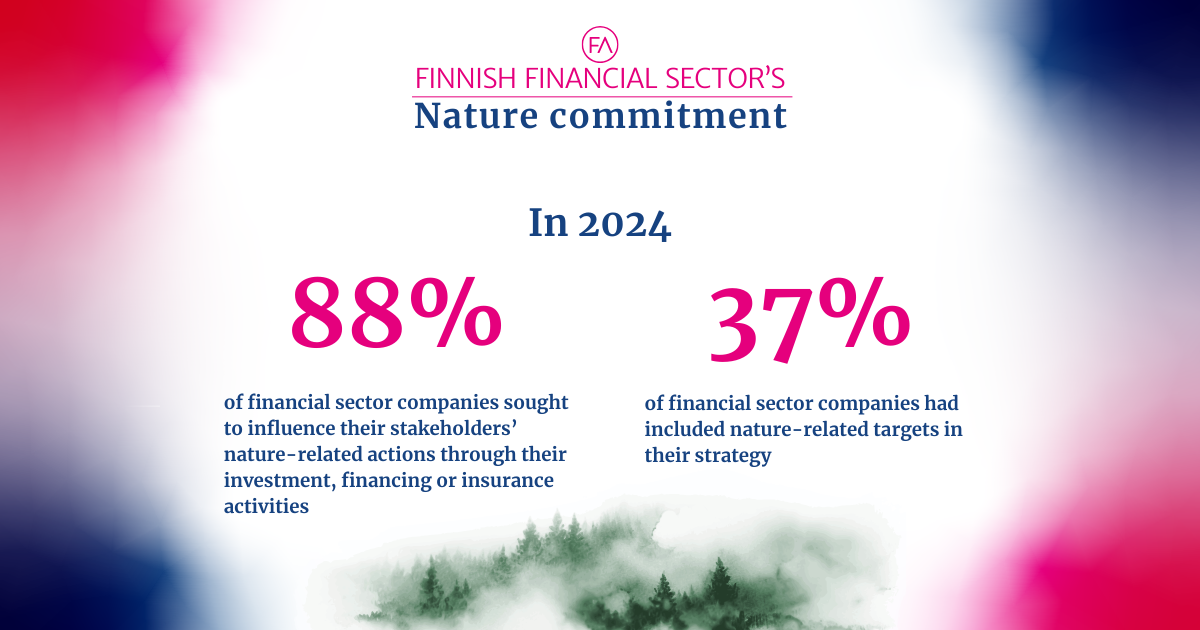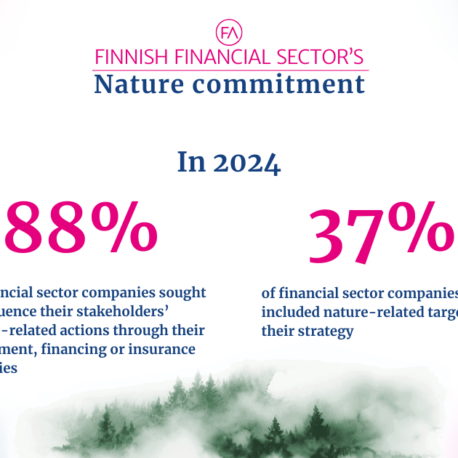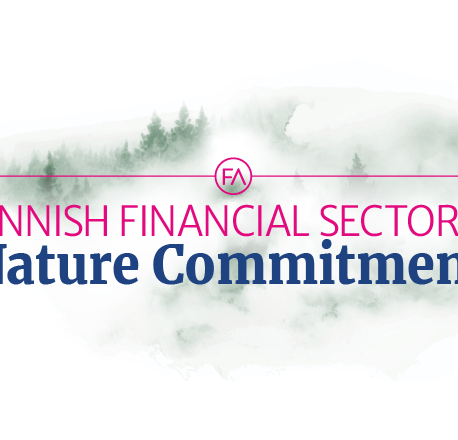
- As part of the Finnish financial sector’s nature commitment, Finance Finland conducts an annual survey to monitor and describe the sector’s measures to prevent biodiversity loss between 2024 and 2028.
- Financial sector companies have a significant role to play in protecting biodiversity as investors, financiers of growth and insurers of risks.
- According to the results, 88% of the responding companies sought to influence their stakeholders’ nature-related activities.
- Although the majority of companies have recognised the significance of nature for their business operations, only a little over a half have a biodiversity roadmap or strategy in place.
- The results of the first survey are now reported and cover the year 2024. Sixteen financial sector organisations responded to the first survey, ranging from large corporate groups and pension insurers to smaller companies. Owing to the diversity of the respondent group, some respondents may have submitted responses on behalf of several member organisations when they belong to the same group or corporate structure.
As part of the Finnish financial sector’s nature commitment, Finance Finland conducts an annual survey to describe and monitor the sector’s measures to prevent biodiversity loss between 2024 and 2028. According to results from the first survey, financial sector companies are very much aware of biodiversity loss: 93% report that they have identified nature-related dependencies or risks in their operations.
“Companies are at very different stages on their nature journey. Some have long recognised and factored biodiversity loss into their operations, while others have only recently begun to consider the link between biodiversity and their business more closely. It is valuable that the responses reflect both ends of this spectrum – and everything in between”, says Finance Finland’s Head of Public Affairs and Responsibility Pirita Ruokonen.
As investors, financiers of growth and insurers of risks, financial sector companies have a significant role to play in tackling biodiversity loss.
The companies’ toolbox is broad. They can, for example, engage in active dialogue with their investee companies and guide their customers, suppliers and partners to take nature considerations into account.
As investors, financial sector companies can also influence the decision-making of companies in which they hold a substantial ownership stake. According to the survey, 88% of the companies reported that they seek to influence their stakeholders’ actions related to nature through investment, financing or insurance activities.
One company carrying out investment operations described its approach as follows: “We encourage our investee companies to address biodiversity risks and adopt related policies. We reach out to companies in high-risk sectors and encourage them to report transparently on the impacts and risks of their operations for biodiversity. Taking biodiversity into account is also part of our compliance monitoring.”
“Financial sector companies have a powerful opportunity to accelerate the shift towards an economy where nature-related impacts are systematically considered in business. When biodiversity is considered in investment, financing and insurance activities, the effect is not limited to a single company but extends across the entire value chain: to customers, partners and the businesses receiving capital. In this way, the financial sector can also spur others into action”, Ruokonen notes.
Survey results are encouraging, but more concrete action is needed
Most respondent organisations have recognised their connections with nature, but the consideration of nature-related impacts and dependencies has not necessarily yet become an established part of their processes. A little over half of the organisations have a biodiversity roadmap, strategy or similar guidelines in place. However, only 37% of respondents reported having nature-related targets in their corporate strategy.
”It is encouraging that companies have recognised the importance of nature for their business. The next natural step is to set concrete nature-related measures and targets to work towards”, Ruokonen emphasises.
The aim of the financial sector’s nature commitment is to show over a longer-term perspective how companies’ efforts to integrate nature considerations progress across five assessment years. The first results have now been published, and the monitoring will continue on an annual basis until 2028.
“I’m pleased and proud that our member organisations have taken the bold step of disclosing how they are addressing biodiversity in their own operations. With the first year’s results now reported, this is a strong starting point for tracking how they evolve in the years to come.”
Still have questions?
|Contact our experts
Looking for more?
Other articles on the topic

Walking the talk – How financial sector companies are acting on biodiversity loss

Hooray for simplifying regulation! But obligations must be streamlined thoughtfully, without compromising environmental goals

Preventing biodiversity loss must be given top priority – also in business

Sustainable finance reporting requirements must not be reduced at the expense of the environment




